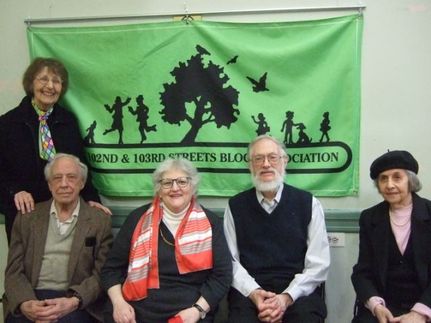2011 Honorees

From left to right: Mildred Speiser, Ernest Sanders, Marsha & Robert Dennis, and Hilda Muchow.
Robert and Marsha Dennis have moved once since 1961, from one apartment in 885 West End to another. From that building, Bob continues to enjoy his long career in music, first as a pianist and then as a composer, whose employers included just about every big name musical organization in town. His big break came with the production of Oh Calcutta!, for which he was both composer and lyricist.
Marsha held various jobs at Columbia before becoming a genealogist, a consultant for the Lower East Side Tenement Museum, and researcher for biographers capturing the lives of notables such as Al Capone, Ella Fitzgerald and Billie Holliday. Together they have raised three sons at 885, two of whom have remained in the neighborhood.
When asked to identify something that has remained the same since they moved into the neighborhood, they agreed that the look of the buildings has remained fairly constant, as has the long wait time for the #5 bus. In the what’s different category, they note that there are fewer eccentricities among the residents, but that’s it’s become possible to come home by taxi.
Edith Eisler, who moved into 300 Riverside with her parents in 1950, continues to enjoy a career in music. She is a corresponding editor for Strings magazine, author of 21st Century String Quartets, violinist, violist, teacher of individuals, and coach of groups. She notes that one of the biggest differences she has observed was that most of the Eastern European Jews are gone and you don’t hear Yiddish on the street anymore. Editor's note: Edith passed away shortly after induction to our Hall of Fame. Our sympathies go to her family.
Hilda Muchow , who moved into the Broadmoor in 1960, didn’t stray far from her childhood home: she grew up just across Broadway on W. 104th St. In between she lived for a while in California, then came back to be an office worker at Columbia as well as at the Interchurch Center. She’s an opera enthusiast, with a preference for Wagner. She observes that the Post Office on 104th Street has remained pretty much the same. She notes that there are more trees, a positive difference, but less diversity among the local businesses. She remembers jumping rope and playing hopscotch right out on the street, not in a playground, and eating at the Automat, which stood on the SE corner of Broadway and 104th St., where the Rite Aid is now.
David and Theresa Rogers regretted that they couldn’t join us tonight. But since they’ve been with us in the neighborhood since 1960, we can give them a pass. They moved into 875 WEA as newlyweds, enjoyed short commutes to their jobs as sociologists at Columbia and and raised their three sons there. One has remained on the Upper West Side. David is the author of the recently published Mayoral Control of New York City Schools. Theresa has conducted numerous research studies for private foundations.
They find that the progressive, cosmopolitan tone of the neighborhood hasn’t changed and refer to it as their “liberal oasis.” The biggest differences they’ve noticed are both positive ones: families with school-aged children are remaining in the neighborhood and they find that there’s much more of a sense of community today than there was when they moved in.
Ernest Sanders is so grateful to the colleague at Columbia who tipped him off to a 6-room apartment that was available in 885 West End 50 years ago that he doesn’t even mind that the rent isn’t $138 anymore. He and his wife Marion moved from the east side and raised their children on our side of town. Marion worked as a researcher and reporter at Time Inc. He was chair of the music department at Columbia and now enjoys being out and about, by which he means, for instance, walking across the George Washington Bridge and, when he grew tired of waiting for the bus to arrive, back again.
The biggest difference that he identified was that buildings are mainly co-ops now rather than rentals, but describes the opportunity to buy his apartment at the insider price as the “greatest good fortune.” The peril that taxis present to bicycle riders is a constant, and led to his family’s insistence that he give up the handlebars.
[Editor's note: Ernest passed away on January 13, 2018.]
Mildred Speiser fell in love with the Master Apartments when she was just a child living on W. 89th St. and her mother took her to a performance there. In 1961 she moved in and now enjoys her status as the resident of longest-standing in that building. She’s the building historian, arranger of its 75th and 80th anniversary celebrations, a published poet and writer whose titles include Secret Lives of Presidents’ Wives and Our Founding Sisters. She is founder of the Hunter High School alumni association, former owner of a pickle manufacturer, board member of the Shadow Box Theatre, founder of the Riverside Park poetry event, longtime “architect of human destiny,” her far superior term for what the rest of us know as a teacher, and stalwart Block Association collaborator.
The look of West End Ave. and Riverside Park, she finds, are about the same as they were when she moved in. She commented on the lack of diversity among the neighborhood businesses as a difference, noting in particular the absence of the 5 and 10 cent stores. She believes the sense of community that’s developed in the time she’s been a presence in the neighborhood is a significant and positive difference. Not having street cars on Broadway nor the subway in the middle of the street are big changes as well.
Marsha held various jobs at Columbia before becoming a genealogist, a consultant for the Lower East Side Tenement Museum, and researcher for biographers capturing the lives of notables such as Al Capone, Ella Fitzgerald and Billie Holliday. Together they have raised three sons at 885, two of whom have remained in the neighborhood.
When asked to identify something that has remained the same since they moved into the neighborhood, they agreed that the look of the buildings has remained fairly constant, as has the long wait time for the #5 bus. In the what’s different category, they note that there are fewer eccentricities among the residents, but that’s it’s become possible to come home by taxi.
Edith Eisler, who moved into 300 Riverside with her parents in 1950, continues to enjoy a career in music. She is a corresponding editor for Strings magazine, author of 21st Century String Quartets, violinist, violist, teacher of individuals, and coach of groups. She notes that one of the biggest differences she has observed was that most of the Eastern European Jews are gone and you don’t hear Yiddish on the street anymore. Editor's note: Edith passed away shortly after induction to our Hall of Fame. Our sympathies go to her family.
Hilda Muchow , who moved into the Broadmoor in 1960, didn’t stray far from her childhood home: she grew up just across Broadway on W. 104th St. In between she lived for a while in California, then came back to be an office worker at Columbia as well as at the Interchurch Center. She’s an opera enthusiast, with a preference for Wagner. She observes that the Post Office on 104th Street has remained pretty much the same. She notes that there are more trees, a positive difference, but less diversity among the local businesses. She remembers jumping rope and playing hopscotch right out on the street, not in a playground, and eating at the Automat, which stood on the SE corner of Broadway and 104th St., where the Rite Aid is now.
David and Theresa Rogers regretted that they couldn’t join us tonight. But since they’ve been with us in the neighborhood since 1960, we can give them a pass. They moved into 875 WEA as newlyweds, enjoyed short commutes to their jobs as sociologists at Columbia and and raised their three sons there. One has remained on the Upper West Side. David is the author of the recently published Mayoral Control of New York City Schools. Theresa has conducted numerous research studies for private foundations.
They find that the progressive, cosmopolitan tone of the neighborhood hasn’t changed and refer to it as their “liberal oasis.” The biggest differences they’ve noticed are both positive ones: families with school-aged children are remaining in the neighborhood and they find that there’s much more of a sense of community today than there was when they moved in.
Ernest Sanders is so grateful to the colleague at Columbia who tipped him off to a 6-room apartment that was available in 885 West End 50 years ago that he doesn’t even mind that the rent isn’t $138 anymore. He and his wife Marion moved from the east side and raised their children on our side of town. Marion worked as a researcher and reporter at Time Inc. He was chair of the music department at Columbia and now enjoys being out and about, by which he means, for instance, walking across the George Washington Bridge and, when he grew tired of waiting for the bus to arrive, back again.
The biggest difference that he identified was that buildings are mainly co-ops now rather than rentals, but describes the opportunity to buy his apartment at the insider price as the “greatest good fortune.” The peril that taxis present to bicycle riders is a constant, and led to his family’s insistence that he give up the handlebars.
[Editor's note: Ernest passed away on January 13, 2018.]
Mildred Speiser fell in love with the Master Apartments when she was just a child living on W. 89th St. and her mother took her to a performance there. In 1961 she moved in and now enjoys her status as the resident of longest-standing in that building. She’s the building historian, arranger of its 75th and 80th anniversary celebrations, a published poet and writer whose titles include Secret Lives of Presidents’ Wives and Our Founding Sisters. She is founder of the Hunter High School alumni association, former owner of a pickle manufacturer, board member of the Shadow Box Theatre, founder of the Riverside Park poetry event, longtime “architect of human destiny,” her far superior term for what the rest of us know as a teacher, and stalwart Block Association collaborator.
The look of West End Ave. and Riverside Park, she finds, are about the same as they were when she moved in. She commented on the lack of diversity among the neighborhood businesses as a difference, noting in particular the absence of the 5 and 10 cent stores. She believes the sense of community that’s developed in the time she’s been a presence in the neighborhood is a significant and positive difference. Not having street cars on Broadway nor the subway in the middle of the street are big changes as well.

